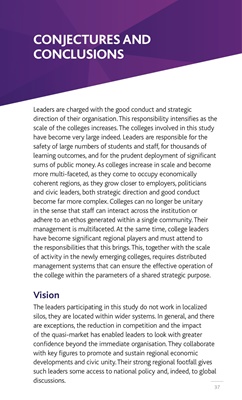
37
Leaders are charged with the good conduct and strategic
direction of their organisation. This responsibility intensifies as the
scale of the colleges increases. The colleges involved in this study
have become very large indeed. Leaders are responsible for the
safety of large numbers of students and staff, for thousands of
learning outcomes, and for the prudent deployment of significant
sums of public money. As colleges increase in scale and become
more multi-faceted, as they come to occupy economically
coherent regions, as they grow closer to employers, politicians
and civic leaders, both strategic direction and good conduct
become far more complex. Colleges can no longer be unitary
in the sense that staff can interact across the institution or
adhere to an ethos generated within a single community. Their
management is multifaceted. At the same time, college leaders
have become significant regional players and must attend to
the responsibilities that this brings. This, together with the scale
of activity in the newly emerging colleges, requires distributed
management systems that can ensure the effective operation of
the college within the parameters of a shared strategic purpose.
Vision
The leaders participating in this study do not work in localized
silos, they are located within wider systems. In general, and there
are exceptions, the reduction in competition and the impact
of the quasi-market has enabled leaders to look with greater
confidence beyond the immediate organisation. They collaborate
with key figures to promote and sustain regional economic
developments and civic unity. Their strong regional footfall gives
such leaders some access to national policy and, indeed, to global
discussions.
CONJECTURES AND
CONCLUSIONS